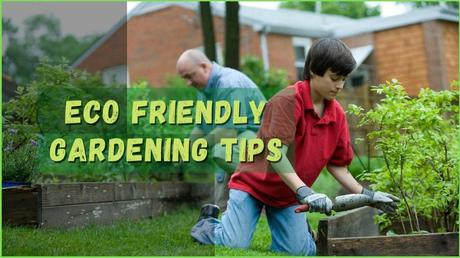
Gardening is one of the best healers for your soul.
How do you start living the eco-friendly life that you always wanted?
You start with baby steps and apply a few methods in the place where this eco-friendly journey begins.
Your garden.You start from making some tweaks in your gardening methods and gradually, you adapt this organic kind of living entirely.
In this article, you will realize why and how gardening helps the environment, and you will find gardening therapeutic. The world deserves to know more about it.
So, read on, spread the word, and help the world adopt zero waste and eco friendly gardening practices.
1. Follow the '5 Rs' of eco friendly gardening
Before we jump on the sustainable gardening tips, you should know how it's important to bring back the learnings from the past. We all remember the 3 R's that were taught to us.
Reuse, Reduce, and Recycle.These 3 Rs remain the same, but with an extension of two more.
Reconsider and Rethink.Following these 5 R's can save the environment in time. The key is to apply these 5 Rs in all aspects of life, including gardening and landscaping. This brings us to the first tip, and that is always applying the 5 Rs in gardening.
- Reduce: Avoiding the use of chemical-based pesticides and fertilizers.
- Reuse: Using stuff from the household for gardening.
- Recycle: You can use the vegetable scraps, your grass clippings, and plant trimmings by turning them into compost.
- Reconsider: Choose eco-friendly solutions for gardening. Use leaves as mulch or get it from the Municipal Corporation of your city. Be mindful of your purchases.
- Rethink: Think twice before you take a step. It allows you to choose a new method to make your garden more sustainable.
This is the eco-friendly way and never throw anything easy.
Rethink if the material could be reused just the way it is or gets recycled. Now you would be wondering which gardening guide will help you with it. But there is one. Think creatively. Think out-of-the-box. Think of ways how you can make utilities for your garden with the stuff not needed.
On the web, you will find many revamped things for sale. And they aren't that cheap. So Why not make your own upcycled item when it is possible. They will make your garden look cooler and enhance its vibe.
2. Go for eco-friendly gardening materials
It is easier to say 'Go Green' than actually doing it in real life.
You have to give it thought and put efforts to bring it in your gardening. Green material that reduces carbon footprint will be sourced from the locality. And this will take some time and searching, but eventually, if you really know what you want, you'll find it either way.
3. Save as much water as you can
We have always been told about how much water we have on Earth, and only 0.3% of it is usable. We have very little water, and therefore, we must save water. For a sustainable future, for the next generations.
Instead of just focusing on how to use less water, you can implement some water conservation techniques in your gardening regime. You can install a button on every pipe and place green plastic tubs. If you have the resources, you can place a rain tank as well. Big collecting tanks can easily collect enough to water your plants. It is clever cost-cutting irrigation that helps you in gardening naturally.
4. Try not to use the sprinkler on your garden
Sprinklers have always been a popular method of irrigation. But when we talk about conservation of water, this method is not as beneficial for gardening. The water reaches the plants, but it doesn't reach the roots in the optimum quantity.
5. Buy bigger pots
Large plants pots relatively contain more soil. And more soil is equivalent to more water retention in the pot and therefore, the plants don't dry out as quickly. They might seem like a bigger investment for gardening; however, in the long run, they will be better for your plants.
6. Cut back on chemicals
Chemicals have never been good for gardening. The yield may be faster, but it ruins the plants. Feeding the soil with chemical fertilizers destroys the intricate web of life in the soil. As a result, it ruins the soil structure. Then the soil gets compact, and the plant roots find it difficult to breathe.
7. Improve your soil
Improving soil for your eco gardening needs a lot of compost or well-rotted manure. Healthy soil teems with essential microorganisms. They make your plants healthy that don't succumb to pests and diseases. Add some compost as it soaks up water the way sponge does. It's useful in free-draining sandy soils.
8. Make your own compost
Making your compost is a fun process in gardening. You just keep saving all your biodegradable waste in a particular place, and in a few days, your compost is ready. It is a tremendous way of recycling green waste. Homemade compost is great for gardening plants. The best part is that they cost you nothing, but they give you a lot.
So, take a huge bucket with a lid or dig up some space in your garden with your gardening accessories. And put all your green waste in the same. You can also use the excessive grass from your garden.
9. Take it From Your garden to the kitchen
Many believe that gardening will save the world, and we agree with that. But we also believe that it will save your hard-earned money. Think of the money you spend on your groceries every month, and think of saving a huge percentage from it and eating good organic food. That should bring a smile on your face, right?
Plant some useful vegetables, take care of them, and the fruits (not literally!) will be delicious and nutritious. From personal experience, it is really fun to pluck your tomatoes from your vegetable garden and use it for cooking purposes.
10. Go With Natural pest control
Enough of the chemical sprays that just don't hurt the pests, but your plants too. So, as an alternative, you can use natural pest control. Especially when you want to garden organically, natural pest control is the way to go.
You can easily make pest control sprays from ingredients found at home. Or you can also use potato beetles or slugs. This method leads your way to spend more time with the plants and can spot diseases, if any, in the early stages.
8 Natural and Homemade Insecticides to Save Your Garden
11. Support recycled products
If you don't have the time to recycle/upcycle for your gardening activity, doesn't mean you cannot get them. There are second-hand shops and online garage sales where you can find an easy bargain for used gardening products. There you can also learn and get a lot of inspirations for your future DIY gardening accessories.
12. Connect over gardening
Gardening also opens a door for connecting to people in the local area.
There will be one common interest, i.e. gardening or agriculture that brings you all together. You can form a green community where you can share tips and ideas that you learnt during the process. You can hold weekly meetings about gardening and exchange plants as well.
To sum up
We hope these gardening tips help you become better and do so more eco friendly gardening. And what would be even better is to spread the word of eco friendly gardening. Try to make it a cult in your locality and help people learn why gardening is good for the environment and your soul.
Archie was a builder for more than 40 years. Mainly after his retirement, the enthusiastic electrical works in his garden and writes for a blog HomeMaker Guide to keep himself occupied. His many years of experience can get you the right tool reviews whether it is a drill, welding machine, or so. An impressive fact to note about him is that almost everything in his house is a representation of his skills made by his hands.

